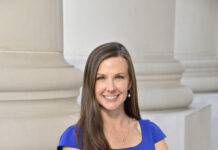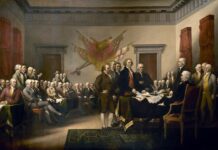“Eternal life will be like immersing yourself in the ocean of infinite love where time – a before and an after – no longer exists. Fullness of life and joy: This is what we hope for and expect from our being with Christ.” – Pope Emeritus Benedict XVI
On New Year’s Eve, Pope Emeritus Benedict XVI (Joseph Ratzinger) passed away at the Mater Ecclesiae Monastery in Vatican City. At the news of Benedict’s passing, the Catholic community across the world mourned for the venerable figure. But first, I shall share Benedict’s incredible and inspiring journey of faith.
EARLY LIFE
Joseph Ratzinger was born in April 1927 in Bavaria, Germany. Ratzinger’s father was a policeman and his mother a hotel cook. In 1933, at the age of 6, Ratzinger witnessed the Nazis’ seizure of power in Germany. However, his family actively criticized and opposed Hitler and the Nazis’ policies. As a result, the family suffered demotions, social humiliation, and frequent harassment. In 1939, Joseph Ratzinger was sent to the seminary. As WWII dragged on, Ratzinger was conscripted into the Hitler Youth as membership was required for all teenage boys at the time. In 1945, Ratzinger deserted his unit and surrendered to American troops.
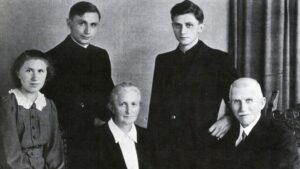
PATH TOWARDS PAPACY
After the war, Joseph Ratzinger continued his education in the seminary and was ordained a priest in 1951. Also, Ratzinger was awarded a doctorate degree in theology at the University of Munich in 1953. From that point forward, Ratzinger taught philosophy and theology at multiple universities throughout Germany. In 1969, Ratzinger returned to Bavaria – his home region – and became the vice president of the University of Regensburg. During his time, Ratzinger and other priests established Communio. Communio was a federation of theological journals intended to teach Catholic thought and maintain the spirit of Vatican II.
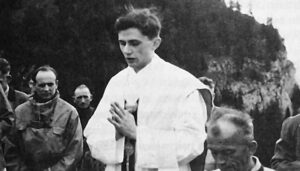
During his long academic career, Ratzinger wrote a number of theological works. These works included Introduction to Christianity (1968) and Dogma and Revelation (1973). Ratzinger’s work in theology eventually led to his service at the Second Vatican Council (1962-1965). However, the young theologian’s views gradually transformed. In the 60s and 70s, a number of political upheavals rippled throughout Europe. For example, many German university students started to protest and publicly denounce Christianity. As a result, Ratzinger began to adapt a more rigid conservative theological viewpoint.
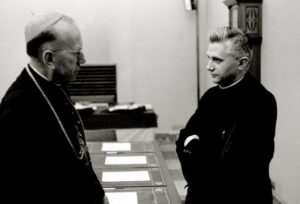
In 1981, Ratzinger was appointed as prefect of the Congregation for the Doctrine of Faith by Pope John Paul II. Since then, Ratzinger developed a strong friendship with the Polish pope as they shared many things in common. For instance, both Ratzinger and Pope John Paul II once suffered under totalitarian regimes and are active proponents of preserving Catholic doctrine. As prefect, Ratzinger was known to be a fervent defender of canon law. Even some of the harshest liberal critics recognized Ratzinger for his objectivity and intelligence. Also, Ratzinger helped spearhead historic efforts to reach out and seek interreligious dialogue with other faiths, especially Judaism and Islam.
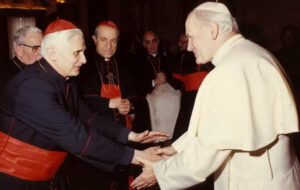
ELECTION AS POPE
In 2005, before his election as pope, Ratzinger was identified as one of the 100 most influential people in the world by Time. The reason for this was Ratzinger’s development as a renowned intellectual scholar who always maintained his wise composure. Following the death of Pope John Paul II, Cardinal Joseph Ratzinger was appointed pope. Soon, Ratzinger changed his name to Benedict in honor of St. Benedict of Nursia (founder of Benedictine monasteries and prominent theologian) and Benedict XV (mediator between nations in WWI).
NOTABLE ACCOMPLISHMENTS
From his tenure as pope, many conclude that Pope Benedict XVI was a “Doctor of the Church.” In fact, Benedict XVI was more than that. Benedict paved new ways in the fields of revelation, Christology, and liturgy and united all of the mentioned disciplines under one category. This category indicates that God’s revelation is the Word or the Logos, a God who allows us to worship him in spirit and truth. So, Benedict XVI can also be considered “The Doctor of the Logos.”
Then, Benedict’s theology inspired countless believers and converts by providing healing and hope for the community and addressing the Church’s challenges in a modernizing world. For instance, in his pioneering Introduction to Christianity (1968), Benedict argued that “Christian faith lives on the discovery…of a meaning that knows and loves [an individual].” In other works, Benedict projected post-Vatican II dialogue’s purpose: evangelization of cultures and awareness of Jesus Christ being the source of truth for everyone. Hence, Benedict earned the nickname “the Mozart of Theology” due to the pope’s tireless upholding of the faith and passion for classical music.
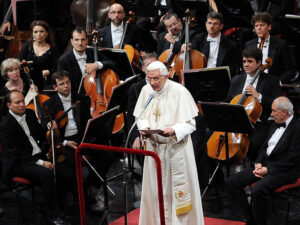
During his papacy, Pope Benedict wrote several notable encyclicals. One of them is Caritas in Veritate, which is Pope Benedict’s most prominent encyclical. First, called “Charity in Truth” in English, this encyclical defines the title as truth-filled love serving as the driving force behind human development. This indicates that love helps promote peace and justice. Also, Pope Benedict asserts that the Church’s goal is not to interfere in states’ politics, but to proclaim the truth and ensure complete human development under God’s direction. Then, regarding economic matters, Pope Benedict states that the most essential aspects of human development are openness to life and the creation of ‘ethical’ sectors to ensure economic equality.
DISTINGUISHING CHARACTER
“Yet I admire and shall revere the memory of Benedict for a simple reason: He was a man.” – William Edmund Fahey, 3rd president of Thomas More College
The previous pontiff, Pope John Paul II was remembered for his visible manliness – owing to his outdoor activities in the mountains and great athleticism. Along with his physical stature, Pope John Paul II was admired by many for his determined tenacity who actively defied communism. But, Pope Benedict’s courage operated more discreetly. Benedict was more of a teacher who preferred conversation in a seminar room, filled with scholarly minds and books.
In addition, since his ordination, Benedict had to balance his quiet scholarly pursuits with administrative work. Even before his papacy, Benedict declared that he wished to retire to his Bavarian house near Regensburg in order to write books. However, Pope Benedict accepted God’s call for him to be the leader and pillar of the Catholic Church. In the end, Benedict had to forsake his desire for a quiet life for the common good.
CONCLUSION
The greatest legacies of Pope Emeritus Benedict XVI are his fruitful and inspiring theological writings. Even though he had a relatively short papacy due to his resignation (owing to health issues he suffered from), Pope Benedict has been widely recognized and appreciated. Many world leaders and theologians laud the pope for his refined intellect, even when he is confronted by those who disagree with him. Through his calm and unassuming presence, Pope Benedict has been and will continue to be a source of inspiration in the years to come.
“The world offers you comfort. But you were not made for comfort. You were made for greatness.” – Pope Emeritus Benedict XVI




